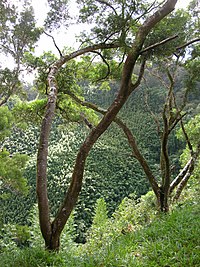| Acacia confusa | |
|---|---|

| |
| Scientific classification | |
| Kingdom: | Plantae |
| Clade: | Tracheophytes |
| Clade: | Angiosperms |
| Clade: | Eudicots |
| Clade: | Rosids |
| Order: | Fabales |
| Family: | Fabaceae |
| Subfamily: | Caesalpinioideae |
| Clade: | Mimosoid clade |
| Genus: | Acacia |
| Species: | A. confusa
|
| Binomial name | |
| Acacia confusa | |

| |
| Range of Acacia confusa | |
| Synonyms | |
Acacia confusa is a perennial tree native to South-East Asia. Some common names for it are ayangile, small Philippine acacia, Formosa acacia (Taiwan acacia), Philippine Wattle, and Formosan koa. It grows to a height of 15 m. The tree has become very common in many tropical Pacific areas, including Hawaii, where the species is considered invasive.[3]
Uses
[edit]The wood has a density of about 0.75 g/cm3.[4] In Taiwan, its wood was used to make support beams for underground mines.[citation needed] Acacia confusa is challenging to work and for this reason was traditionally burned as firewood or turned into charcoal in Taiwan. In later years it was exported to China to be made into wood flooring for the American market. At its height Taiwan exported more than 1,000 containers of Taiwan acacia to China. More recently it has been used domestically to produce high value wood products like musical instruments, furniture, and bathtubs.[5]
The wood is also converted to charcoal for family use. The plant is used in traditional medicine[6] and is available from herbal medicine shops in Taiwan, but there has been no clinical study to support its effectiveness.[citation needed]
Phytochemicals
[edit]Phytochemicals found in Acacia confusa:
Root bark
[edit]Seeds
[edit]- Oxalyldiaminopropionic acid (α-amino-β-oxalylaminopropionic acid),[8] which can cause neurological damage, paralysis, and death.
Stems
[edit]- N-Methyltryptamine, 0.04%[7]
Varieties
[edit]See also
[edit]References
[edit]- ^ Botanic Gardens Conservation International (BGCI).; IUCN SSC Global Tree Specialist Group (2019). "Acacia confusa". IUCN Red List of Threatened Species. 2019: e.T18435782A145823048. doi:10.2305/IUCN.UK.2019-2.RLTS.T18435782A145823048.en. Retrieved 7 September 2021.
- ^ "ILDIS LegumeWeb (version 10)". www.ildis.org. Retrieved May 21, 2020.
- ^ "Acacia confusa risk assessment". www.hear.org. Retrieved May 21, 2020.
- ^ "Appendix 1 - List of wood densities for tree species from tropical America, Africa, and Asia". www.fao.org. Retrieved May 21, 2020.
- ^ "Taiwan Acacia's Commercial Evolution". topics.amcham.com.tw. Taiwan Topics. 19 May 2021. Retrieved 21 May 2021.
- ^ Li, Thomas S. C. Taiwanese Native Medicinal Plants: Phytopharmacology and Therapeutic Values, CRC Press (2006), ISBN 0-8493-9249-7, p.2. online GoogleBooks preview
- ^ a b c Arthur, HR; Loo, SN; Lamberton, JA (1967). "Nb-Methylated tryptamines and other constituents of Acacia confusa Merr. Of Hong Kong". Australian Journal of Chemistry. 20 (4): 811. doi:10.1071/CH9670811.
- ^ Quereshi, M.Yasin; Pilbeam, David J.; Evans, Christine S.; Bell, E.Arthur (1977). "The neurolathyrogen, α-amino-β-oxalylaminopropionic acid in legume seeds". Phytochemistry. 16 (4): 477. Bibcode:1977PChem..16..477Q. doi:10.1016/S0031-9422(00)94332-2.
External links
[edit]- Erowid Acacia vault
- Acacia confusa at DMT-Nexus wiki
- Acacia confusa Merr. Medicinal Plant Images Database (School of Chinese Medicine, Hong Kong Baptist University) (in Chinese) (in English)



